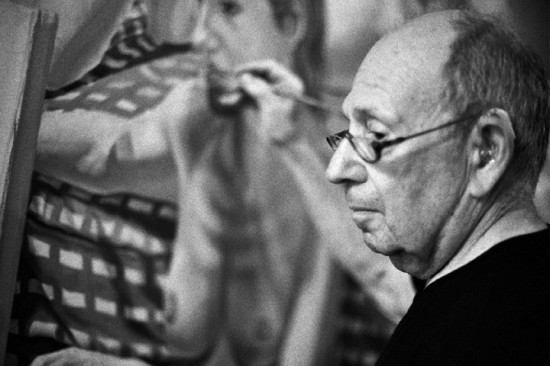
Philip Pearlstein, regarded as one of the most important American Realist painters of the 20th Century won a Scholastic Art & Writing Award as a teenager in Pittsburgh, PA. In the following interview from 2003, he talks about what winning meant to him.
Interviewed by Fawnee Evnochides February 26, 2003
Which award did you win in 1941? For painting?
I was in the 11th grade. I got $25 the first time. I won one for painting and one for watercolor and the following year I won 1st prize for oil and also for colored inks and in addition I got a scholarship for the first year of college at Carnegie.
What did it mean to win the award for you at the time?
The money was terribly important. It was the beginning of WW2 and the depression was still happening. And it meant I got to college. And LIFE magazine did a big story on 1941 and the two paintings were reproduced in full color. One was a painting of a carousel. It was realistic. And the other was a black barbershop.
WW2 came along at the end of freshman year, and I was inducted along with the rest of the students and spent the next three years in the army as a GI. But the pages of LIFE served as a passport for me to do sign painting, so I never had to go into combat. It saved my life.
And when I came back to Carnegie in fall of 1946, I started my sophomore year and became friendly with Andy Warhol—he was much younger, but I had lost those three years. And he was intrigued about the fame and I said I had my five minutes of fame. And we would always joke about it.
What does it do for a kid to win this award?
Gives you assurance: tells you you’re okay. Psychologically it’s important. It’s a reassuring starting point. Until you find out there are all these other people that are just as talented and eager as you are.
Have you judged for the Awards before?
A couple of times I was on the drawing awards committee.
What kinds of things do you look for when you judge the work?
We look for inventiveness or extraordinary ability. Extraordinary control or invention. I look for the same things when I jury professional shows too.
Anything else you want to say about the awards?
I think it’s wonderful that it’s done. I wish there were a lot more opportunities like it. I’m always amazed at the number of entries, because you always hear about art being cut out of school programs. So it’s surprising, it’s a real concern that it’s cut out because so many kids find themselves through art.
We live in a society that is totally oriented toward pictures: photos and images have to be controlled and designed and that takes artistic talent and the fact that it is cut out of schools is a big problem. The elimination of all the arts programs across the country right now: the Bush administration is not tuned into the cultural realm. Even during the depression years, you had terrific art programs.
I think visual education is as important as literary or science or math classes. And it takes as much education to see as it does to do anything else.
